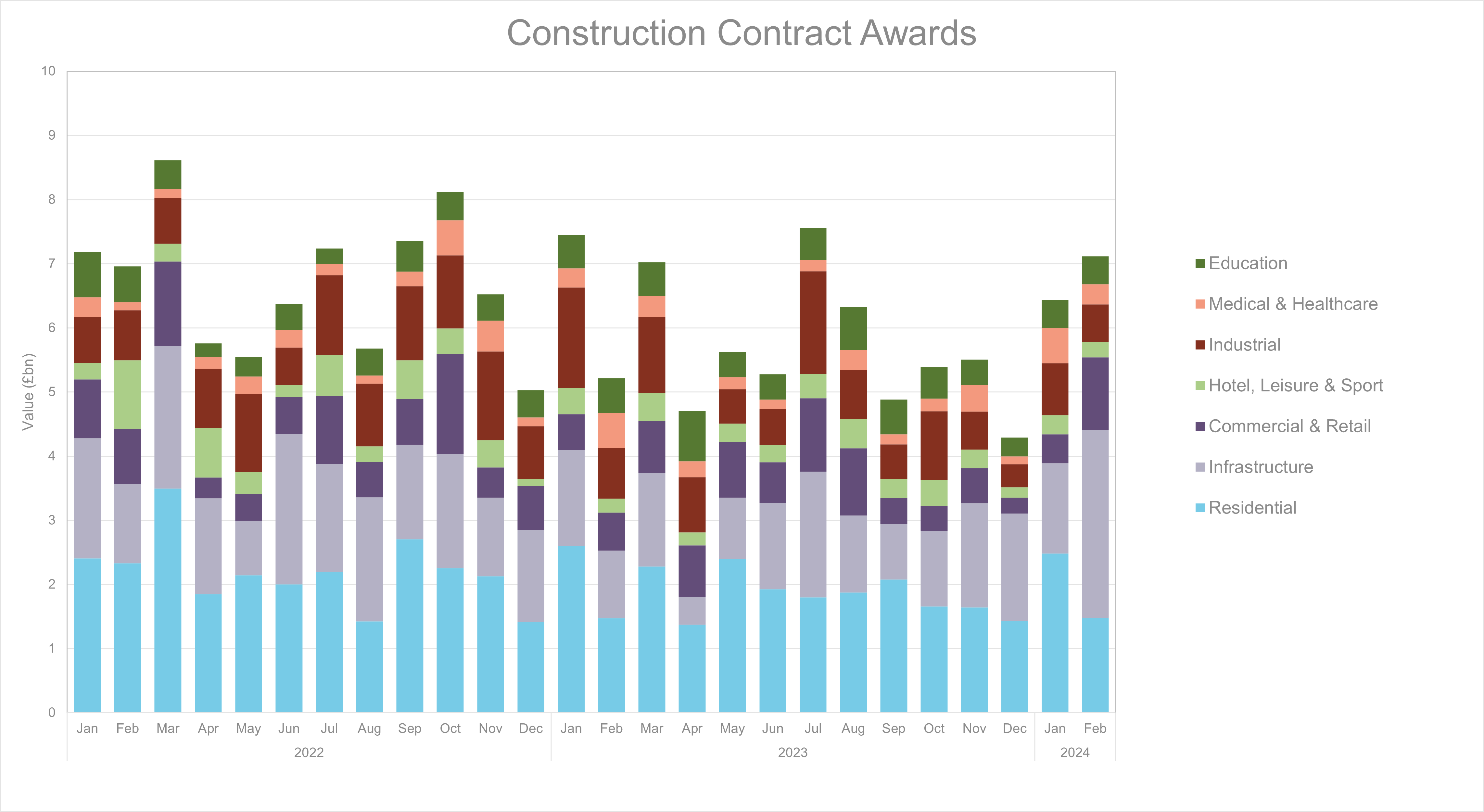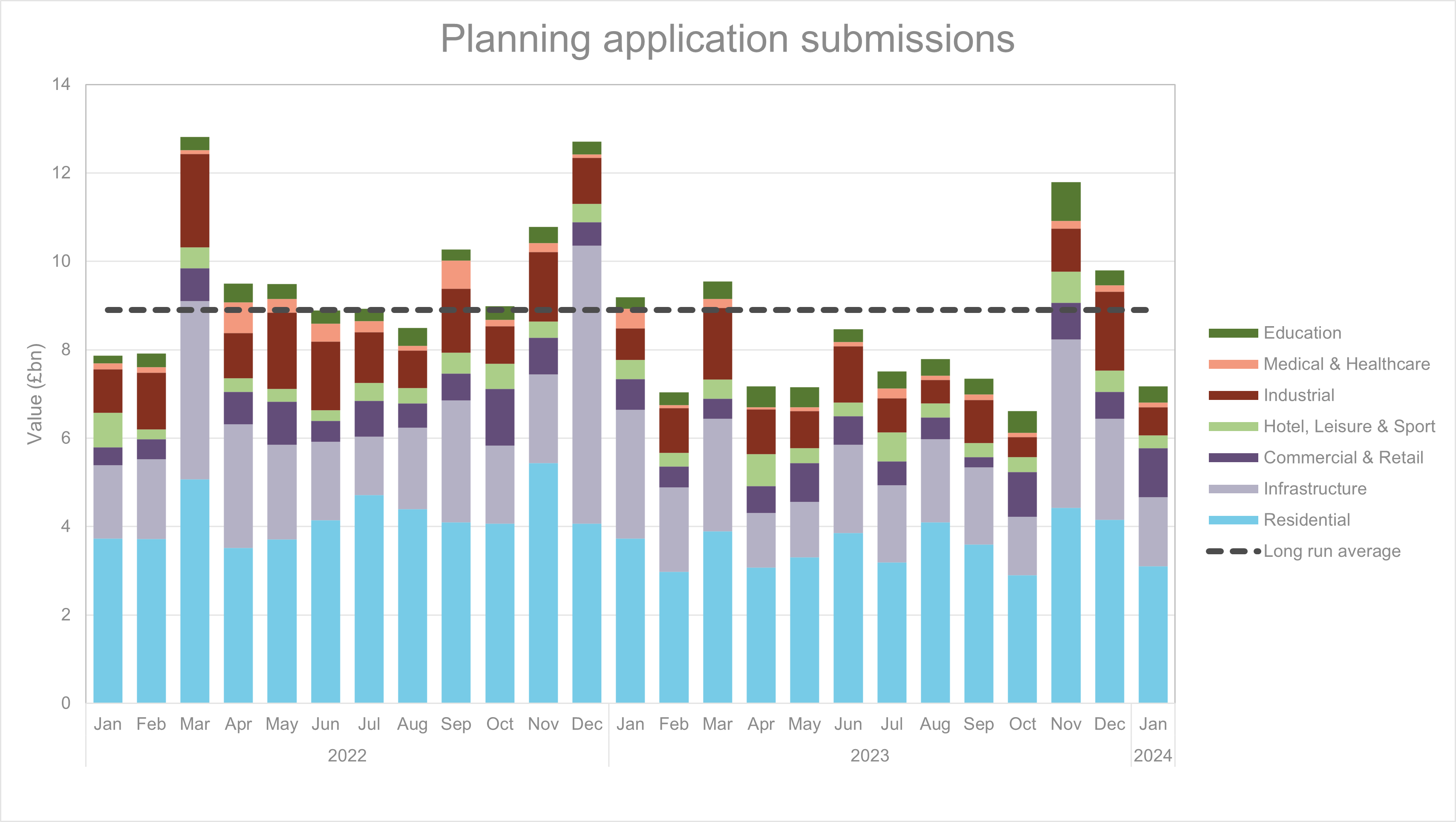Construction contract awards reach 7.1bn in February, their highest level in seven months
- Construction spending at highest levels in months
- Infrastructure is a star performer, reaching highest spending level in over four years
- Commercial has a stellar month as mega projects are confirmed
- Businesses remain coy on new planning applications as they await better economic news
February saw construction contract awards reaching £7.1bn, their highest level in seven months, according to Barbour ABI’s latest data. An 11% increase in contract awards in February appeared to confirm the increased spending trend reported by Barbour in January, as industry spenders continued to flex their muscles.
Infrastructure was the star performer with spending increasing by 108% on January. Contracts for two road tunnels under the Thames for the Lower Thames Crossing in Kent were agreed with a value of £1.3bn.
Better prospects are also in store for the commercial sector as the significant headwinds faced since the onset of the global pandemic begin to ease.
A 152% increase in spending included the £330m refurbishment of Citi Group’s iconic 42-storey tower at Canary Wharf finally got into contract in February, adding to the already sizeable pipeline of extensive refurbishments in the commercial sector.
Redevelopment of ITV’s former recording studio on London’s Southbank gained planning consent after a lengthy delay and Stanhope submitted revised plans for what will become the City of London’s tallest tower – 1 Undershaft – in January.
Barbour ABI consultant economist, Kelly Forrest commented:
“Generally, commercial project viability remains tight, but progress on these mega projects is nevertheless great news for the industry. Along with infrastructure, these sectors are providing an antidote to continued malaise in residential construction, which is still being weighed on by higher mortgage rates and weak consumer confidence.”
First look at 2024 planning applications
March provided a first look at planning applications in 2024. At £7.1bn in January, applications were 22% lower than a year ago with residential, Industrial and infrastructure all seeing sharp drop offs.
Forrest continued: “Notably, we are seeing clear divergence emerging between spending and new planning applications. Decision makers are eager to get existing and approved projects off the ground, but they don’t yet have the confidence to look ahead to new work. Viability is a big factor constraining developers’ appetite to present schemes to planners, but this should improve when financing costs start to reduce.”
--Barbour ABI 12:28, 18 Mar 2024 (BST)
[edit] Related articles on Designing Buildings
- April turn for the worse, for construction, as market seesawing continues
- Best value procurement.
- Bid evaluation.
- Contract award.
- Contracts under seal v under hand.
- Construction contract.
- Construction industry revs engines in January.
- Contract negotiation.
- Education and Health applications shine in subdued construction October market.
- Infrastructure tumbles, adding to construction industry woes.
- Letter of award.
- Most Economically Advantageous Tender (MEAT).
- New energy rules, a threat to towns and cities across UK
- Procurement route.
- Subdued planning environment figures provide scant hope for house-building targets
- Tender processes.
- UK Construction saw an £11.1bn fall in spending in 2023
- New energy rules, a threat to towns and cities across UK
- Infrastructure tumbles, adding to construction industry woes
- Construction industry revs engines in January
Featured articles and news
UKCW London to tackle sector’s most pressing issues
AI and skills development, ecology and the environment, policy and planning and more.
Managing building safety risks
Across an existing residential portfolio; a client's perspective.
ECA support for Gate Safe’s Safe School Gates Campaign.
Core construction skills explained
Preparing for a career in construction.
Retrofitting for resilience with the Leicester Resilience Hub
Community-serving facilities, enhanced as support and essential services for climate-related disruptions.
Some of the articles relating to water, here to browse. Any missing?
Recognisable Gothic characters, designed to dramatically spout water away from buildings.
A case study and a warning to would-be developers
Creating four dwellings... after half a century of doing this job, why, oh why, is it so difficult?
Reform of the fire engineering profession
Fire Engineers Advisory Panel: Authoritative Statement, reactions and next steps.
Restoration and renewal of the Palace of Westminster
A complex project of cultural significance from full decant to EMI, opportunities and a potential a way forward.
Apprenticeships and the responsibility we share
Perspectives from the CIOB President as National Apprentice Week comes to a close.
The first line of defence against rain, wind and snow.
Building Safety recap January, 2026
What we missed at the end of last year, and at the start of this...
National Apprenticeship Week 2026, 9-15 Feb
Shining a light on the positive impacts for businesses, their apprentices and the wider economy alike.
Applications and benefits of acoustic flooring
From commercial to retail.
From solid to sprung and ribbed to raised.
Strengthening industry collaboration in Hong Kong
Hong Kong Institute of Construction and The Chartered Institute of Building sign Memorandum of Understanding.
A detailed description from the experts at Cornish Lime.



























